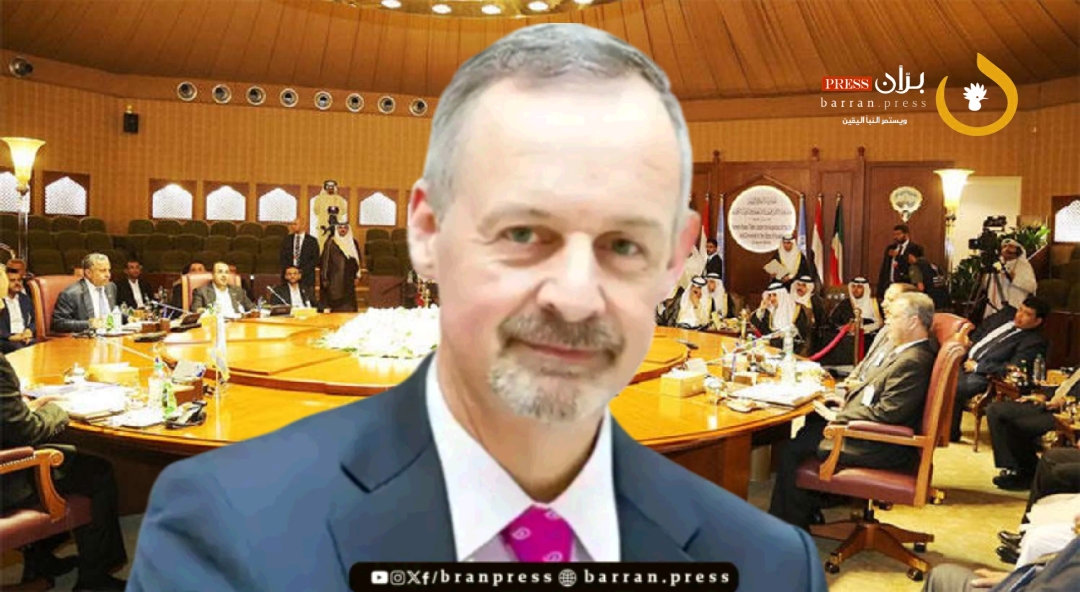


Barran Press
Former British Ambassador to Yemen, Edmund Fitton Brown, has shed light on the behavior of the Houthi delegation during the 2016 Kuwait peace talks, revealing how they sabotaged an agreement that would have granted them significant power in Yemen.
Speaking at a webinar hosted by the Countering Extremism Project (CEP) on June 23, 2024, Brown, now a senior advisor to CEP, shared firsthand accounts of his experiences with the Houthis during his tenure as ambassador from 2015 to 2017.
"During my time as ambassador, we participated in the peace talks in Kuwait during the spring and summer of 2016. I believe these talks represented a genuine opportunity for a positive outcome and a step closer to achieving peace," Brown stated.
He detailed the challenges encountered by the "Group of 18," a coalition of ambassadors supporting peace in Yemen, including the UN, US, and UK. "The Houthi delegation, guests at the talks, proved to be a difficult partner. They consistently made unreasonable demands and exhibited disruptive behavior," he revealed.
Brown described the Houthis' attempts to secure a steady supply of khat, an illegal stimulant in Kuwait, further complicating negotiations. He highlighted their tardiness for meetings, outbursts of anger, walkouts, threats, and frequent shifts in negotiating positions.
"One particularly striking incident involved the closure of Houthi spokesperson Mohammed Abdul Salam's Facebook account due to hate speech content. It was discovered he had used his 13-year-old son's passport to travel to Kuwait," Brown recounted, highlighting the delegation's deceptive practices.
He also pointed out the presence of individuals like Houthi leader Abdulmalik al-Houthi's representative, known for their "detestable and destructive behavior," despite the presence of senior Houthi officials in key positions.
Despite these challenges, Brown emphasized the progress made towards an agreement. "Houthi chief negotiator Mohammed Abdul Salam, who still holds this role today, showed a genuine commitment to the Kuwait talks," he said.
"A framework for an agreement began to emerge, granting the Houthis significant power in Yemen and allowing Saudi Arabia to withdraw with dignity. While this might have marginalized President Hadi, his negotiators realized they wouldn't receive Saudi support to oppose the outcome," Brown explained.
However, just as progress was being made, "instructions from Houthi leader Abdulmalik al-Houthi changed, and the Houthi delegation withdrew from the talks. This effectively froze peace negotiations for years," he said.
Brown published these details to "highlight the nature of the Houthi group and the challenges we faced during direct dealings with them." He stressed the importance of understanding their behavior and tactics.
He found it intriguing that the UN announced a supposed significant step towards a ceasefire in Yemen in late December 2023, without acknowledging the Houthis' attacks on international shipping in the Red Sea. This, he believes, suggests that the Houthis' apparent progress toward peace talks may have been a calculated move to exploit the international community's desire for peace and hinder decisive action against them and Iran.
The Kuwait talks, held between the internationally recognized Yemeni government and the Houthi group, spanned 90 days from April to August 2016. Despite initial optimism, the talks collapsed at the last minute due to the Houthis' alleged withdrawal from signing the agreement, reportedly under instructions from their leader, despite the gains it secured for them.